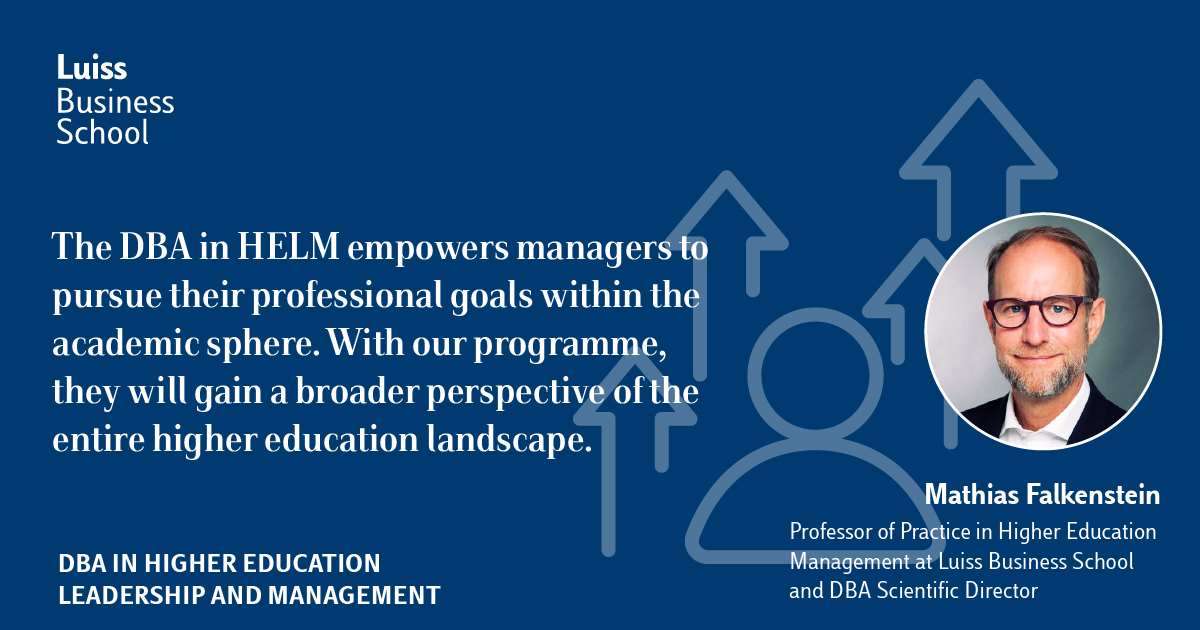
Professor Mathias Falkenstein presents the programme of Luiss Business School dedicated to senior managers and academic leaders that want to build their career in higher education management
In today’s competitive global arena, higher education institutions are grappling with a multitude of challenges, including privatization and the intense competition for top-tier students and faculty. To effectively manage these complexities and maintain a competitive edge, universities require expertly trained and skilled managers. The Doctorate in Business Administration (DBA) in Higher Education Leadership and Management (HELM) programme at Luiss Business School addresses this crucial need by providing aspiring and current managers with the comprehensive academic and professional expertise necessary to navigate the intricate world of higher education administration. The DBA HELM also serves as a powerful career accelerator, empowering individuals to shatter the glass ceiling in university management and ascend to positions of leadership. “The DBA in HELM offers a curriculum that empowers managers to pursue their professional goals within the academic sphere,” stated Mathias Falkenstein, Professor of Practice in Higher Education Management at Luiss Business School and Scientific Director of the DBA. “Our meticulously crafted programme is designed to equip individuals with the knowledge and skills required to address the pressing challenges facing higher education institutions in the ever-evolving global landscape.”
What are the global challenges that the higher education sector is facing now?
The higher education sector is facing a multitude of global challenges that are transforming the landscape of education worldwide. One of the most significant trends is the privatization of higher education, which is leading to increased competition and a focus on quality assurance. Traditional research universities are now facing competition from private institutions that prioritize teaching and applied sciences over research. This shift is driving universities to adapt to international standards and provide a comprehensive range of services beyond academics, including career development, recruitment, and marketing. To remain competitive in this ever-evolving environment, there is a growing demand for well-trained managers who can navigate the complexities of higher education administration. These individuals need to possess a blend of academic expertise, managerial skills, and an understanding of the latest trends in higher education. As a result, there is a pressing need to invest in professional development programmes that equip these future leaders with the knowledge and skills required to succeed in this dynamic industry.
Managers in higher education are quite new in the academic contest, what are the profiles?
The emergence of managers in higher education has introduced a new breed of professionals who must navigate the complex intersection of academic research and business acumen. To thrive in this dynamic environment, these managers need to possess a unique blend of skills and expertise. Our DBA programme specifically targets this niche of hybrid professionals, individuals who have combined administrative and managerial experience with a deep understanding of business principles. Our comprehensive programme is designed to empower managers to excel within their institutions without completely immersing themselves in academia. Instead, they will harness their academic foundation to refine managerial practices and contribute to the success of their organizations.
How?
The DBA in Higher Education Leadership and Management is a programme that will equip managers and academic leaders to better understand the higher education context. Many universities are organized in silos, making it difficult for managers to have a comprehensive understanding of the entire institution. With our programme, they will gain a broader perspective of the entire higher education landscape. Additionally, they will be trained as doctoral students, exposing them to research methods courses and providing them with guidance throughout their research development process. This training can lead to the publication of academic papers, which can form the foundation for research-based lecturing.
What are the skills that managers operating in higher education institutions must have and implement to overcome these challenges?
In the dynamic landscape of higher education, managers and academic leaders need to possess a multifaceted skillset that transcends siloed thinking and encompasses a holistic understanding of the institution’s goals and objectives. We teach our students to navigate the intersection of academic rigor, institutional governance, and financial sustainability. They will develop the ability to foster innovation, implement effective HR practices, and engage in strategic change management to drive positive change within their institutions. Students engage in real-world projects, collaborate with industry experts, and publish their research in peer-reviewed journals. This combination of academic rigor and practical experience prepares them to become highly sought-after leaders in the field of higher education. By nurturing a deep understanding of the big picture and empowering managers to think strategically, we aim to elevate the leadership landscape in higher education. Our graduates will become catalysts for positive change, driving innovation, enhancing faculty and student success, and shaping the future of higher education.
What type of leadership is needed in higher education and why?
Effective leaders in higher education must embrace diversity as a source of strength and innovation, fostering an environment where individuals from diverse backgrounds can thrive and contribute their unique perspectives. Sustainable leaders possess a multifaceted skillset that encompasses strategic thinking, cross-cultural understanding, and the ability to navigate complex power dynamics within institutions. By embracing diversity and fostering inclusive environments, sustainable leaders can create a competitive advantage for their institutions, attracting top students and faculty who seek a supportive and enriching learning experience. Moreover, such leaders can foster innovation, collaboration, and a culture of continuous learning, driving their institutions towards excellence. Our DBA in Higher Education Leadership and Management (DBA-HELM) is designed to nurture these qualities in aspiring leaders, equipping them with the knowledge, skills, and mindset necessary to drive sustainable change and innovation in higher education. Our graduates will emerge as transformative leaders, shaping the future of higher education and fostering a more equitable and inclusive educational landscape for all.
Which are the four core modules?
The first module is “Contemporary International Higher Education: A Global Perspective” with the Module Director Prof. Hans de Wit. The second one is “Strategic Change Management and Innovation in Higher Education”, led by Prof. Nick van Dam. The third is the Module dedicated to “Sustainable Leadership” (Prof. Tony Silard) and the fourth Module is “Lifelong Learning, Business-Model Innovation and EdTech in Higher Education”, co-directed by Prof. Sarah Grant and Nick Barniville.
The university is called upon to provide skills in line with market demands. What should a higher education manager do to shape programme and respond to this need?
In today’s dynamic and competitive landscape, higher education institutions must conduct a comprehensive 360-degree analysis to ensure they are attracting the right students, shaping the right curricula, and aligning their programme with the evolving needs of the employment market. This strategic approach requires a deep understanding of the target student population, identifying the skills and competencies that employers are seeking, and aligning the curriculum to bridge the gap between academic knowledge and industry demands.
What is the Target market of DBA HELM?
The DBA in Higher Education Leadership and Management (DBA-HELM) is designed to empower aspiring and current university leaders to excel in their professional endeavors and make a transformative impact on the higher education landscape. This esteemed programme is specifically tailored for individuals with at least a master’s degree and substantial work experience in the higher education industry. We seek to attract senior and emerging managers and academics, including: Academic and professional programme managers, Directors or managers of international offices and external relations, Directors or managers of executive education programme, Vice-deans or directors of programme, HR directors and managers, Directors or managers of communication, marketing or recruitment, Directors of strategy and policy, Directors or managers of career services, Directors or managers of quality services (accreditations, rankings), Managers of admissions.
24/01/2024













